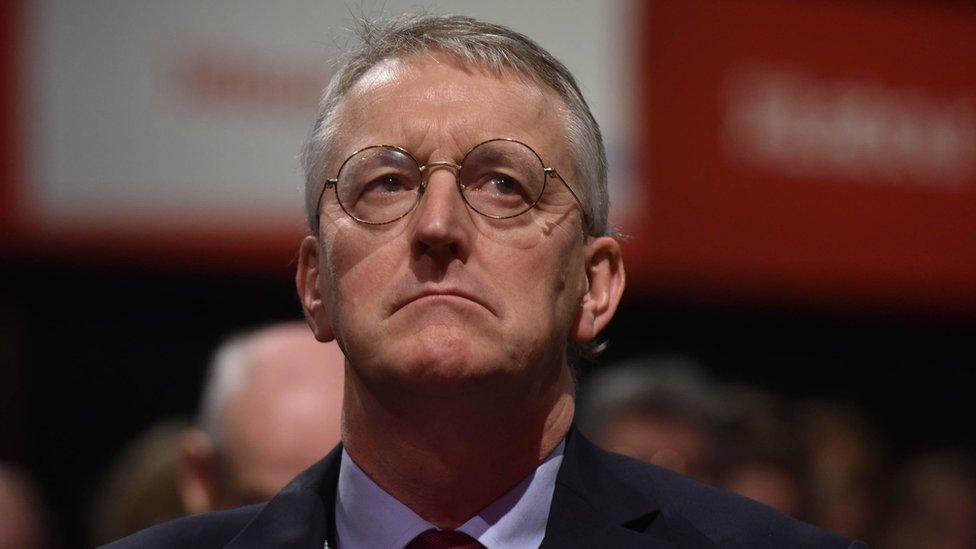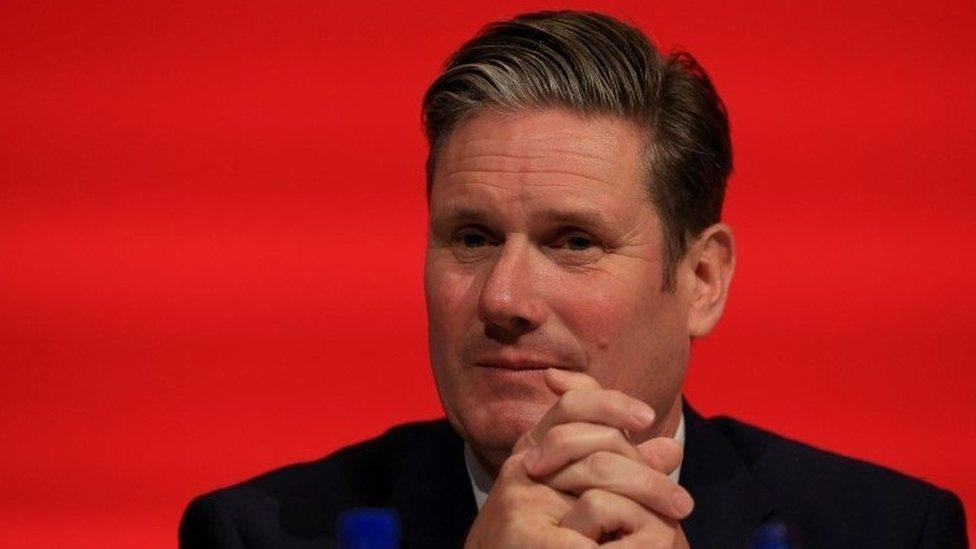Brexit: Labour gets behind bid to stop 'no-deal'
- Published
- comments

Hilary Benn tabled the amendment attempting to block a "no deal" scenario
Labour are backing a cross-party bid to ensure the UK cannot leave the EU without a deal.
Shadow Brexit secretary Sir Keir Starmer said the amendment to 11 December's Commons vote on the PM's Brexit deal had his "full support", external.
If MPs back the amendment it will not be binding but Theresa May would find it difficult to ignore.
And it could put Parliament in the driving seat if, as expected, MPs vote down the PM's Brexit deal.
Mrs May has repeatedly warned MPs that the only alternative to her Brexit deal is quitting the EU without a deal on 29 March.
The vast majority of Labour MPs are expected to vote against the deal on 11 December. However, a source has told the BBC there is a "growing consensus" among all MPs against a "no-deal" Brexit.
Labour leader Jeremy Corbyn told ITV's This Morning on Thursday that "nobody is going to allow no deal".
The amendment, tabled by Labour backbencher and chairman of the Brexit select committee, Hilary Benn, is understood to have support from Conservative, Labour, SNP, Liberal Democrat, Plaid Cymru and Green politicians.
Mr Benn argues it allows parliament to "take back control".
"For two years, she [Mrs May] said no deal is better than a bad deal," he told Radio 4's World at One.
"But frankly no deal all along has been the worst possible outcome and its really important that we close that off. Because we can't afford to fall over the edge of a cliff at the end of March."
Labour MP Yvette Cooper said the amendment would allow MPs to "properly debate and vote on the next steps, rather than just leaving it all" to the prime minister.
The BBC's Laura Kuenssberg says it supports what "some in Number 10 suspect - that is vote falls, Parliament essentially takes over from the executive".
Allow X content?
This article contains content provided by X. We ask for your permission before anything is loaded, as they may be using cookies and other technologies. You may want to read X’s cookie policy, external and privacy policy, external before accepting. To view this content choose ‘accept and continue’.
Former Labour foreign secretary Jack Straw described the amendment as "a staging post" on the way to a further referendum.
Mr Straw, who was one of the Labour more Eurosceptic voices, says he believes there would be "a huge appetite" for a public vote.

A dilemma for the People's Vote
By BBC political correspondent Chris Mason
Enter the four doctors.
A cross party quartet, pondering strategy, talking tactics.
They want another referendum - what campaigners call a People's Vote. So who are they?
Labour's Dr Paul Williams, Conservative GPs turned MPs Philip Lee and Sarah Wollaston, and the SNP's Dr Philippa Whitford.
Messages are zipping between them, trying to work out whether it is worth putting down an amendment to the big Brexit vote in Parliament, so MPs can express their support for another referendum.
I'm told they are in a "genuine dilemma" between wanting to articulate the views of those hundreds of thousands who marched through London calling for a "People's Vote" in October, but not wanting to "scupper the whole process" by failing to get the numbers and allowing opponents to say MPs don't back another referendum.
Senior figures in the People's Vote campaign emphasise that they must strike when their strength is at its greatest: after an expected government defeat on 11 December, when they hope Labour will, after failing to secure a general election, edge towards endorsing another referendum.

Up to six amendments will be voted on when MPs pass judgement on the prime minister's Brexit deal on 11 December.

Sir Keir Starmer says he will back the amendment
Labour's front bench has tabled an amendment saying that the party cannot support the agreement, as it fails to provide for a customs union and "strong single market" deal. It also says it opposes a no deal withdrawal, and "resolves to pursue every option" that prevents such a scenario.
There is also likely to be a front bench amendment from the SNP. Some in Parliament think they are unlikely to pass but they hope a cross-party effort will be seen as less partisan and will have more chance of achieving a majority.
The amendments will be selected by Commons Speaker John Bercow, on 11 December - the last of five days of debate on the Brexit agreement.